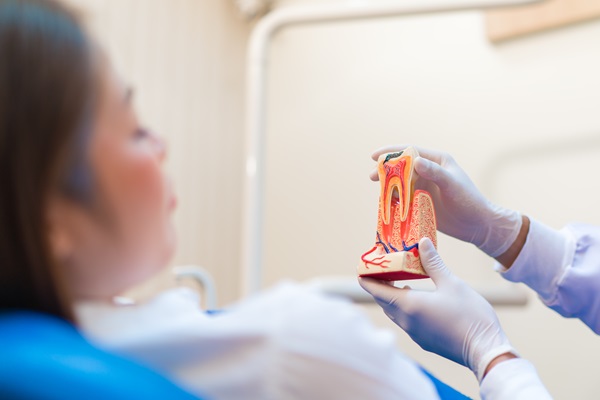Important Information About Root Canal Therapy

A root canal is a procedure that can save severely damaged or decayed teeth, prevent infection, and treat active infections. The process involves removing the pulp in the tooth’s pulp chamber and disinfecting the area. It often takes less than an hour from start to finish.
The pulp chamber of a tooth is the central chamber that is sealed from the rest of the tooth. It has nerves, blood vessels, and connective tissues. A tooth’s pulp plays a vital role in its development, but it is not needed once a tooth is fully grown. At that point, the tooth can get the nutrients that it needs from surrounding tissues.
Damage or decay that reaches a tooth’s pulp chamber will not go away on its own. The pain caused by the injury worsens over time, and the damage can lead to the tooth becoming infected.
Important things to know about root canal therapy
The following are a few of the things that patients should know if they think that they might need root canal therapy.
1. What does the root canal procedure look like?
Root canal therapy typically starts with the dentist administering a local anesthetic. They use a drill to make a hole into the pulp chamber. Files are then inserted into the hole and used to extract the pulp. The files are also used to clean the pulp chamber.
After that, the dentist inserts medication into the hole and reseals the tooth with a rubbery type of filling called gutta-percha. Teeth that have been fixed with root canals are usually rebuilt with composite resin or covered with crowns.
2. What types of dental issues can root canal therapy treat?
Dental issues that can be fixed with root canal therapy include:
- Severely broken, fractured, or decayed teeth
- Infections
3. Is root canal therapy always an option?
It depends on factors like how long a tooth has been damaged. If the damage affects the tooth’s root, an extraction might be the better option. An extraction might also be suggested if there is a significant risk of the infection expanding to other parts of the body, where it can have life-threatening consequences.
4. Does root canal therapy hurt?
No. Dentists inject the area being worked on with local anesthetics before the procedure, so the patient does not feel any pain as the dentist works on their damaged tooth.
Most patients do not report feeling significant pain even after the anesthetic wears off. At most, they might experience slight discomfort that can be managed with over-the-counter painkillers.
5. What are signs that I need a root canal?
Root canals therapy is needed when a tooth's pulp chamber has been damaged. This is the tooth's innermost layer that houses connective tissues, blood vessels, and nerves. These soft tissues are known as the pulp, and the pulp chamber prevents irritants in the mouth from reaching them.
Damage to a tooth caused by tooth decay or trauma can open up the pulp chamber, giving bacteria access to the soft tissues inside. This leads to the most common sign that a person needs a root canal: excruciating tooth pain that makes it impossible to get any sleep at night or focus during the day. Other signs that a person might need a root canal include increased sensitivity to hot, cold, sweet, and acidic foods; fever; pus coming out of a tooth's base; bad breath; and blood coming out from the insides of the tooth.
6. What is recovery like after getting a root canal?
There is no significant recovery period after root canal therapy. Any toothache that the patient was experiencing before their visit should be gone by the time that the procedure is over. It can take a few hours for the effects of the anesthetic to wear off, so dentists typically advise patients to avoid eating for a few hours after the procedure because they can accidentally bite into their tongue or cheeks.
Most people do not report significant discomfort following root canal therapy. Any pain should be minor and can typically be managed with over-the-counter painkillers like ibuprofen and acetaminophen.
Root canals save teeth
Root canal therapy enables dentists to save teeth when the pulp has been compromised. Do you think that you need a root canal? Give us a call or stop by our clinic to set up an appointment.
Request an appointment here: https://www.tj-dental.com or call TJ Family & Implant Dentistry PLLC at (979) 721-9410 for an appointment in our Bryan office.
Check out what others are saying about our dental services on Yelp: Root Canal in Bryan, TX.
Related Posts
Curious about the root canal process? This review discusses the specifics of what you can expect when visiting a dentist for root canal treatment. Read on to learn more about this type of restorative treatment.Every dentist has their own process for root canal treatment, but there is a general process that most follow with patients.…
Maintaining healthy teeth and gums relies heavily on preventive dentistry. Even though many treatments exist that can remove diseased tissue and repair damage, prioritizing good oral health can eliminate the need for many types of invasive dental work. Seeing a dentist at least once every six months is essential, but practicing good oral hygiene on…
Looking for information on preventive dentistry? Read on to learn more. A good preventive dentist can save you money on significant tooth problems, pain, and costly treatments in the future. All treatments or procedures that prevent tooth decay, tooth damage, and gum disease fall under preventive dentistry. Fortunately, when preventive dentistry is incorporated into daily…
Preventive dentistry can help you avoid issues like tooth decay and gum disease, which are the most common issues that dentists deal with. Keeping your teeth and gums healthy starts with having a consistent oral hygiene routine.Many of the dental issues that you might find yourself dealing with start with the bacteria in your mouth.…
